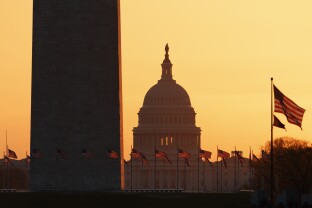The campaign arm for House Democrats has raised millions this cycle to support the party’s effort to retake the majority. But by the end of September, nearly 30% of the caucus had only paid less than half of their suggested dues to the organization, according to a spreadsheet obtained by NOTUS.
The Democratic Congressional Campaign Committee sets dues and fundraising expectations for each member of Congress based on their seniority, committee positions and how much help they’ll need during the election cycle. Frontline candidates — the 31 Democrats who are looking to hold onto seats in competitive districts — don’t have any dues. Meanwhile, Democrats in leadership and committee chairs are expected to transfer hundreds of thousands to the DCCC.
The spreadsheet shows there were 45 candidates who were less than 50% of the way to meeting their dues goals — but had paid more than $0 — with several sitting on significant amounts of cash on hand. Reps. Bill Foster, Lucy McBath and Emanuel Cleaver, for instance, all had over $1 million of cash on hand as of the end of September, per the internal document, but Foster and McBath had paid less than 20% of their required dues by then ( A spokesperson for Foster said the congressman had “fully paid on his dues for this cycle” as of the end of October. Cleaver had paid 44%. McBath isn’t considered a frontliner by the DCCC, but she’s running for reelection in a new congressional district — currently controlled by a Republican — after redistricting.)
